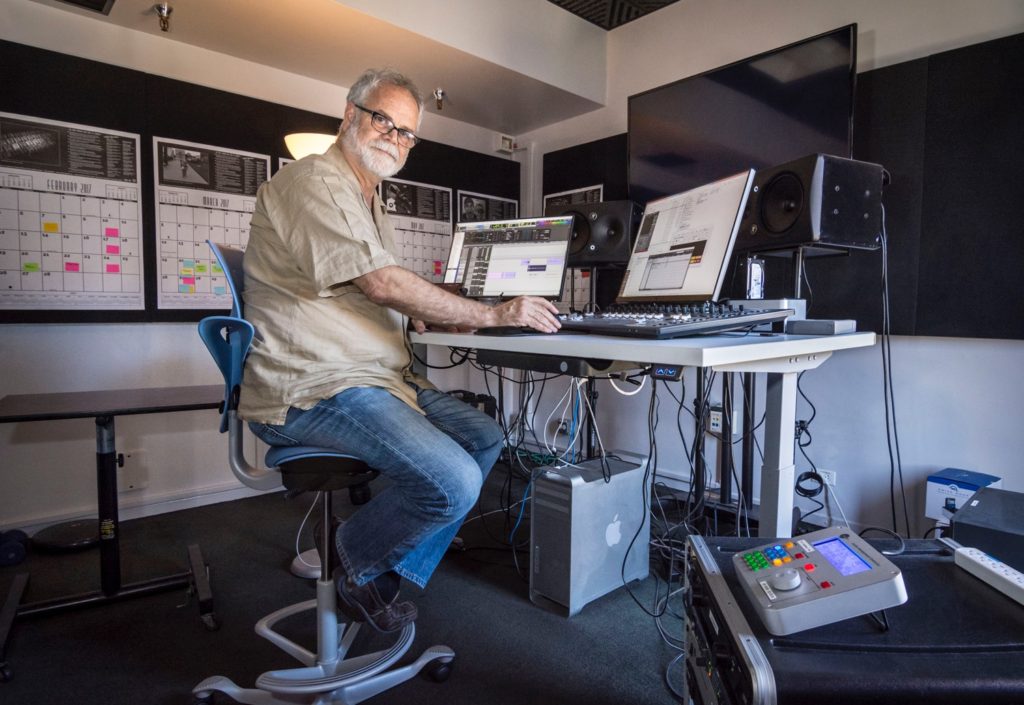Blue Sky’s AMC Makes Every Studio a Sunny Space for Douglas Murray
Busy sound editor, designer and mixer using Audio Management Controller to optimize his nearfield monitor system in different post-production environments.
 LOS ANGELES – March 2017 — It’s not unusual for motion picture sound editors and sound designers to move into temporary facilities during post production, often working in acoustically challenging rooms. To optimize his 5.1 monitor system as he moves from one location to the next, freelance supervising sound editor, sound designer and mixer Douglas Murray added a Blue Sky Audio Management Controller (AMC) to his system in 2016, making particular use of its EQ curve settings and centralized level control.
LOS ANGELES – March 2017 — It’s not unusual for motion picture sound editors and sound designers to move into temporary facilities during post production, often working in acoustically challenging rooms. To optimize his 5.1 monitor system as he moves from one location to the next, freelance supervising sound editor, sound designer and mixer Douglas Murray added a Blue Sky Audio Management Controller (AMC) to his system in 2016, making particular use of its EQ curve settings and centralized level control.
“This is a portable system that I put together for my last film, Gore Verbinski’s A Cure for Wellness,” says Murray, who was the supervising sound editor on the picture. The Blue Sky AMC provides system control of Murray’s monitor rig, which includes five Mackie HR824mkII nearfield speakers with a Blue Sky SUB 15 Universal for low frequency extension. His mobile system also includes an Avid Pro Tools|HDX2, Dock and S3 mixing control surface.
Murray is currently working in temporary accommodations on the 20th Century Fox Studios lot on director Matt Reeves’ War for the Planet of the Apes with co-supervising sound editor Will Files and their team. Murray is also a sound designer on the project. He and Files have co-supervised every film directed by Reeves since Cloverfield, says Murray, whose extensive resume also includes The English Patient, Harry Potter and the Goblet of Fire and Twin Peaks: Fire Walk with Me.
Using Blue Sky’s SRO (System-Room Optimization) software, Murray can precisely measure any room and send the results to the AMC, which applies in DSP the corrective equalization curves that best fit the environment. “It runs through all kinds of options; you can see it trying different curves and finally settling on the one it thinks is going to make your room sound the flattest,” he says.
If the EQ curve is too severe, he says, “You can tweak it so that it’s almost flat but doesn’t have extreme boosts or cuts. It’s a nice procedure to go through to see what is going on in the room. I ended up doing less than it advised me to do, but the resulting sound is subtly better. It’s compensating for the space and the speakers’ own curve. It’s very close to flat. I have checked the results in other rooms and it sounds good, so I’m pleased.”
He continues, “The nicest thing is that you can tweak the levels of all the speakers from the front panel of the box. You don’t have to go around behind the speakers. It’s very simple but I use it when I’m checking the levels in my room. And you can turn bass management on and off, which is also handy.”
Brian Long in the engineering department at Skywalker Sound recommended the AMC, says Murray, who worked at the famed facility for 12 years. “It’s great in that it’s got presets that you can switch between. So now I have ‘flat’ on one button and room EQ on the other. The curve isn’t doing a whole heck of a lot but it does sound a little better in the mid-range to my ear. There is a little more presence in the ‘woody’ range, which is good, because I’m cutting and pre-mixing ape voices and there’s a lot of that in the voices.”
He adds, “And it can handle 7.1, which is essential—that’s why I got it. I also have a 5.1 system with a BMC [Blue Sky’s Bass Management Controller, now discontinued] in my home studio.” Jim Austin, another engineer at Skywalker, recommended the Blue Sky SUB 15 Universal, he says.
Blue Sky’s AMC is powerful but simple to operate, says Murray. “You don’t want a lot of bells and whistles and crazy things that could get you into trouble. This thing does have a lot of power. But I’m trying to use it in a responsible way.”
For a list of Douglas Murray’s credits, visit: www.imdb.com/name/nm0614923/
Image: Douglas Murray using his Blue Sky AMC (lower right corner) at 20th Century Fox Studios working on War for the Planet of the Apes.